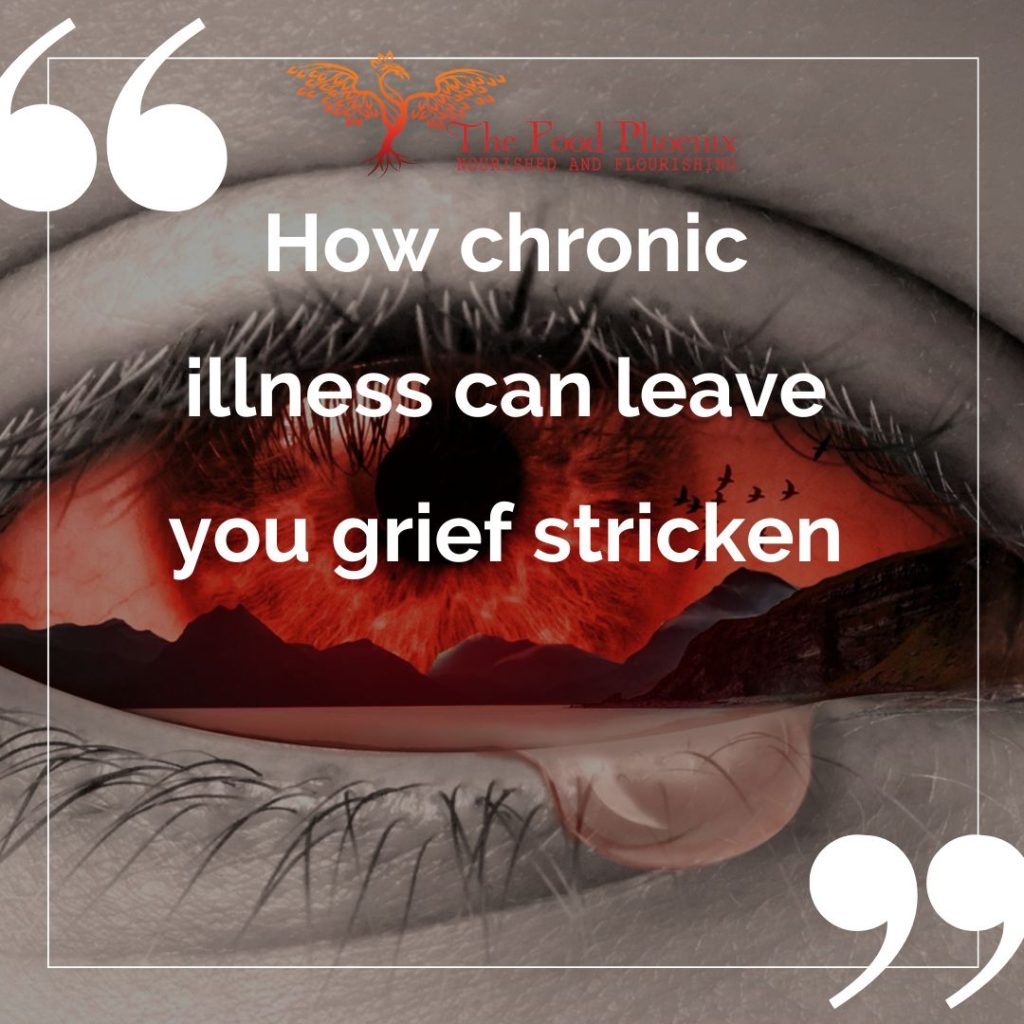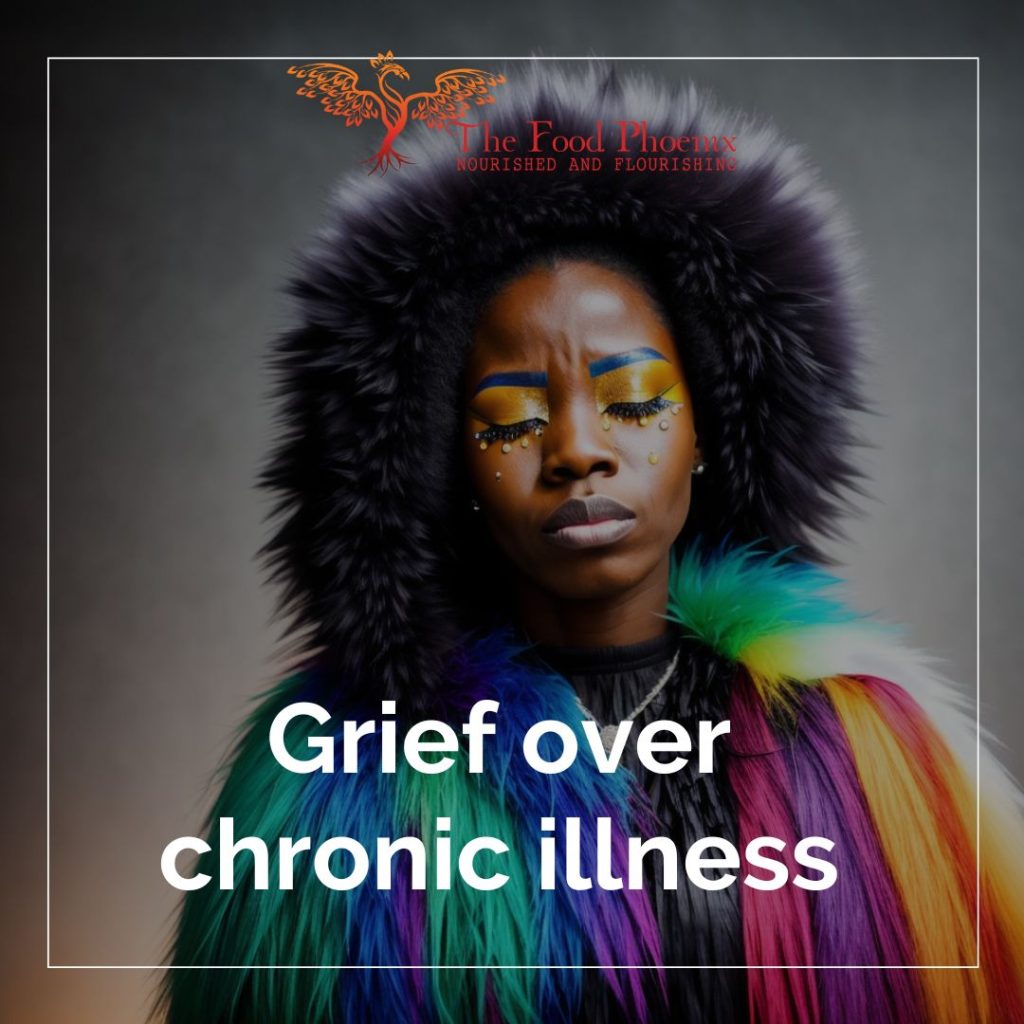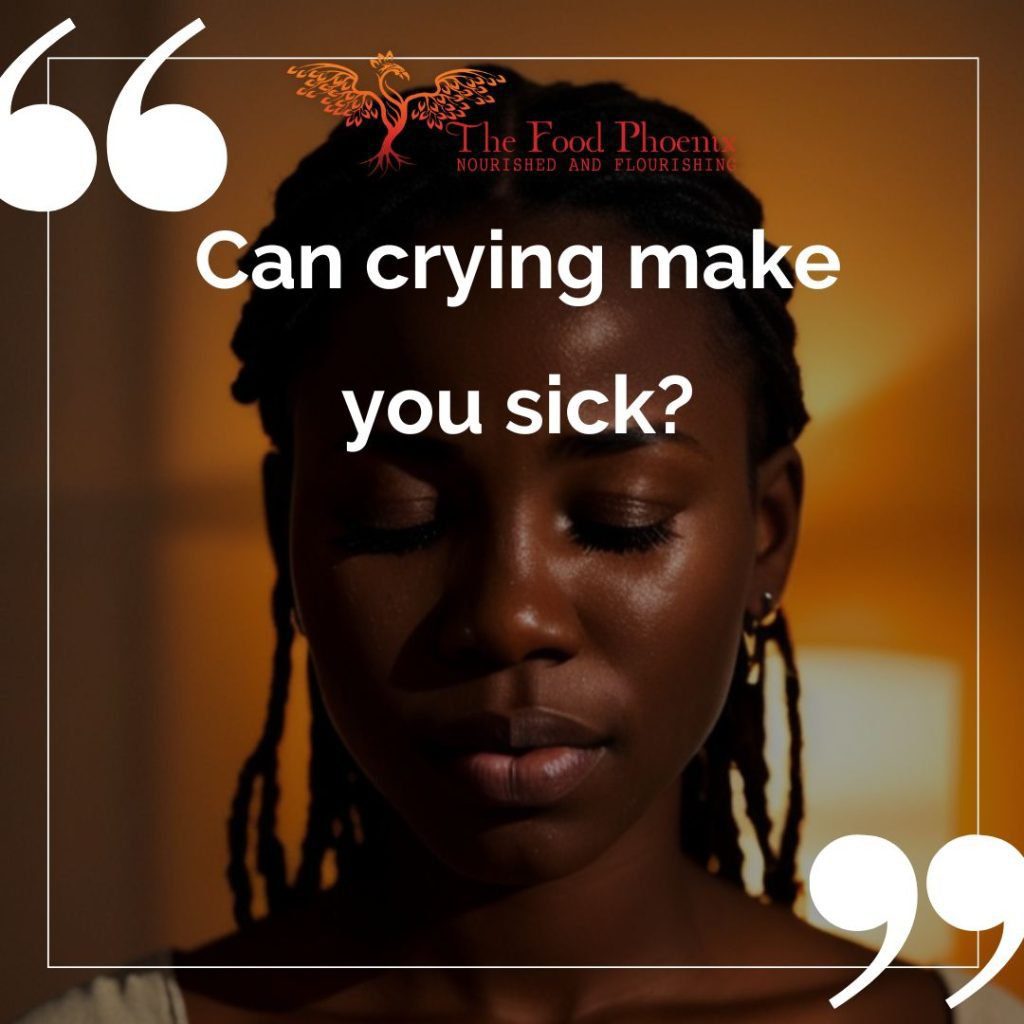How grief over chronic illness can leave you so heartsick, you suffer from physical and emotional consequences
Recently, something unexpectedly made me cry—a lot. And I kept returning to it like a glutton for punishment. They weren’t tears of happiness either. And I felt generally lousy. So, why did crying affect my physical health, and can crying make you sick?
After reflecting for a few days on why something clobbered me repeatedly in the feels so much, I eventually realised why I felt so sentimental. And I thought I would share it here because this affects most people a few times during their lives. So you might find it helpful.
I watched a performance competition called Kingdom (킹덤) Legendary War featuring some of the best young Korean boy groups in K-Pop when Stray Kids put on an incredible cover of a song called “I’ll be your man.“
It’s customary for music and harmonies to make me emotional, but that’s not exactly what made me weep. On the other hand, lyrics are essentially poetry and can convey powerful emotions. But a big chunk of the lyrics were in Korean, so my understanding of what they were singing about was sketchy since it’s hard to concentrate on the translations while listening and watching the performance. So it puzzled me why this particular song was so hard-hitting.
And then it struck me: the song was about loss and grief, and through their performance and the props on stage, they could act out a story that I could understand. In fact, it was like an entire novel condensed into 4 minutes. It was such an accomplishment it would have made the Reduced Shakespear Company proud.
Grief and loss are arduous elements of the human experience. But, unfortunately, they come knocking on all of our doors, so it’s not like we can avoid them, although we may wish to.
On the surface, this song was about how we react to bereavement. But music and visual arts are open to interpretation. And Stray Kids seem to write songs with many layers of meaning. So although the original song was about love lost, Stray Kids reworked it to completely alter the meaning.
The Many Faces of Grief: Understanding Mourning Beyond Bereavement
Whenever we talk about grief, our thoughts usually automatically turn to the experience of losing someone we love through death. Of course, this is natural as, for most of us, death holds a terribly grim finality where you can never reconnect with that person again in this life. And we’re faced with the loss but also regrets about things we feel we ought to have said, done or not done. And over the last few years in a global sense, death has become more common than it had been for a long time. I’ll say no more here about the underlying drivers of the massive death rate spikes.
The Universality of Grief: How Our Bodies Respond to Loss
Many people more expert than I can provide detailed and valuable information about grief as it relates to bereavement. But I wanted to talk about a few other sources of mourning other than the demise of a loved one (that includes fur-babies) that we all face and how they can be devastating.
No matter the cause of your grief, your body will respond in the same way: it can’t tell whether you’re grieving because you’re mourning the loss of a treasured person, pet, career, your health, or even your religion or faith in some greater power – even if that power is scientific research, the healthcare system, dietary dogma, or environmental sacred cows. If those things used to make up a precious part of your constitution, suddenly losing them can be unimaginably stressful.
Bearing that in mind, what I’m going to discuss about what triggers grief, how it makes us feel, how we respond, and the consequences of all of these things can still be relevant for any other causes of grief. The magnitude of the grief and the symptoms may vary, and your response to grief may not be the same as someone else’s, but the guiding principles remain the same.
There’s a good chance that you’re reading this post because you’ve gone through a traumatic loss recently or you’re still going through that process. And for that, I’m so genuinely sorry. No matter the cause, mourning sucks. And even as you’re reading this, you may need to hug yourself and take a few slow, deep breaths to settle your head if you find that you’re overwrought.
But despite this, I’d still like you to take a step back and remember some of the times in your life when you’ve experienced losses. The loss doesn’t need to be a monumental one. You might think that to anyone else, it was a loss so trivial they wouldn’t have even noticed it. But it was important to you. And as you’re reading now, put yourself back in your younger self’s shoes and try to recall how you felt and responded. Do any of the emotions or physical responses sound familiar?
The Stages of Grief with Chronic Illness: Coping with the Loss of Health
Almost any loss can trigger grief. And some of the most significant losses we can face are caused by wounds to our physical, mental, emotional, moral, and spiritual health. Or, through empathy, we can experience the same sense of mourning vicariously when someone we love endures these wounds.
Illness is never welcome. Sometimes, it can seem like sickness is genetically predetermined, leaving you unable to dodge it. And that can make you feel helpless. But it’s important to remember that despite this, you can also suffer from grief over chronic illness.
Meanwhile, at other times, your health fails because of your life choices or some harm done to you by another person. Many of the injuries inflicted by other people are all too apparent. In comparison, others are more subtle yet no less calamitous.
Even people you turn to for help can injure you, usually unintentionally. Unfortunately, the absurd and appalling truth is that your doctor is the person most likely to kill you, and for every death caused by healthcare, how many more injuries also occur? In large part, the pharmaceutical industry can mislead even the best-intentioned doctors. I explain how medical injuries are so prevalent in this article, where I ask if Big Pharma is killing for profit.

Betrayed by Healthcare: The Shocking Truth About Medical Injuries and the Destruction of Well-being
Unfortunately, medications may be the third leading cause of death in the Westernised world. Meanwhile, unknown numbers of people are maimed and harmed by medications but survive with a quality of life far lower than before. Like many other people (including a significant segment of my clients), I’ve dealt with the long-term repercussions of toxicity from gadolinium MRI dyes. I’ve written about this experience here, here, and here if you’d like to compare notes. While many other clients have had their well-being destroyed by other medications like psychotropic drugs and fluoroquinolone antibiotics. The fallout from medical injuries may affect you for the rest of your life.
Prescription Drugs and Toxicants: The Hidden Culprits Behind Chronic Illness and Grief
During the free clarity calls that I offer, it’s common for people to break down into tears as they release the overwhelming grief that accompanies the violation and hurt they feel having experienced the destruction of their health at the hands of health care.
They feel betrayed because they know that the people with whom they placed their trust let them down. And frustrated and aggrieved when, instead of trying to undo the harm, their doctors trivialise their drug-induced side effects and reassure them that it’s all in their minds in what can only be described as medical gaslighting. The only thing that shocks me is that everyone who speaks with me about their experiences isn’t bawling their eyes out. Can crying make you sick? In this case, it’s the other way around; chronic illness can lead to anguish.
The Hidden Grief Over Chronic Illness: How Toxicity from Medications Can Cause Long-Term Harm
Many people start on new medications not only to manage their grief over chronic illness but also to deal with the adverse effects of drugs, heavy metals, and toxins like gadolinium contrast, oxalates, mercury, lead, arsenic, thallium, or cadmium. The standard treatment route is to prescribe more and more medications to suppress symptoms of toxicity like:
- pain,
- abnormal digestion,
- low mood,
- high blood pressure,
- weight changes,
- and poor metabolic health.
So even when the despair and crying don’t make you sick, the antidepressants and other medications you’re prescribed likely will. You can discover more about how prescription drugs and other toxicants can destroy your health here.
The Immune System Casualty: How Toxicity Leads to Infections and the Need for Antibiotics
You might even be prescribed antibiotics to treat infections, as the immune system is another casualty of toxicity.
If you’ve also suffered from drug-induced side effects, I bet you’ve felt betrayed, angry, and violated. That’s a predictable response because something cherished has been stolen from you: your health, future, dreams and aspirations. Perhaps even your relationships, too.
The 5 Stages of Grief Chronic Illness Can Trigger
Dealing with a chronic health condition often involves working through considerable grief and adjustment. While not linear, many experts point to the five stages of grief as a framework that can help chronically ill patients process their emotions. Here’s a brief overview of each stage and what they may look like in the context of an ongoing health struggle:
Denial
In the initial shock of a chronic illness diagnosis, it’s common for people to deny the seriousness or permanence of the condition. They may act as if everything is fine. Denial can provide temporary emotional protection.
Anger
As denial fades, anger often emerges about the unfairness of the situation. You may lash out at doctors, family members, or your own body. Anger is a normal response to any loss of health, independence, or future plans.
Bargaining
Some people try bargaining with doctors, other authority figures, or a higher power to delay or lessen the severity of symptoms. “If I take this new treatment, can I be healed?” is a common thought.
Depression
Sadness sets in as the permanence of the condition sinks in. Low mood, lack of motivation, insomnia, and other depressive symptoms aren’t uncommon. This stage acknowledges the substantial losses that come with chronic disease.
Acceptance
The final stage is adapting to a “new normal” and finding purpose despite limitations. Patients accept their diagnoses and focus on maximising quality of life within boundaries. While never complete, acceptance facilitates better long-term adjustment.
Revisiting these stages as needed can help chronically ill individuals process ongoing challenges over the lifespan of managing their conditions. Support groups provide space to feel validated at each step.
The Emotional Rollercoaster of Grief: Navigating the Ups and Downs of Mourning
Dealing with grief is an emotional rollercoaster ride. You’re not only subject to the denial, anger, bargaining, depression, and acceptance that the 5 stages of grief chronic illness models talk about. Of course, you could also argue that the following symptoms fit into the depression stage of the 5 stages of grief chronic illness model. There’s also:
- guilt,
- anxiety,
- hopelessness,
- bitterness,
- distrust,
- sense of betrayal,
- confusion and disorientation,
- disappointment,
- fear of the unknown,
- fatigue,
- demotivation,
- restlessness,
- isolation,
- emptiness,
- shame,
- irritability,
- revulsion,
- feeling tearful,
- angst, and
- the loss of your dreams for the future.
To complicate things more, the physical effects of grief over chronic illness and your response to them don’t just affect you; they can have knock-on effects on your family, friends, colleagues and the people around you. This has many repercussions. You might even feel that you need to be the strong one, comfort other people, and hide how much you’re hurting from them. This can be especially tough when you’re suffering. And can feel very unfair.
The Stages of Grief with Chronic Illness: Symptoms and Life Changes to Expect
When side effects are severe, you may also need to alter several aspects of your life. Your symptoms arising from the stages of grief with chronic illness may limit your ability to perform tasks. These can range in complexity and severity, so their impact can encompass the spectrum from irritating to life-changing. Symptoms of grief over chronic illness may affect your ability to work and to care for yourself and others. They may reduce your capacity to maintain your social connections through symptoms like:
- brain fog,
- concentration problems and disorganisation, resulting in difficulties in planning,
- memory issues,
- fatigue,
- pain,
- incoordination and movement problems,
- anxiety,
- depression,
- lack of motivation,
- weakness,
- gut symptoms, and
- insomnia.
The Complexity of Grief: Can Crying Make You Sick?

..you know that a good, long session of weeping can often make you feel better, even if your circumstances have not changed one bit."
Lemony Snicket, The Bad Beginning Tweet
Crying is one of the ways we cope with grief. But I hope I’ve been able to show you that the grieving process is complex. Crying is one of the healthier ways to deal with loss. You even wash away some of the stress hormones you produce when you’re feeling distressed in your tears. In this way, you can help to regulate your emotions and alleviate some of your emotional overwhelm.
On the contrary, if you bottle up your feelings, you may remain tense longer. And this can extend and amplify the effects of stress on your body in physical and psychological ways.
But the reasons you’re crying can make you physically sick, especially if you avoid facing them for prolonged periods. The hurt can gouge out your insides like a hyena disembowelling a wildebeest.
Does Crying Make You Sick? It's More Complicated Than That
There has been debate about whether crying can directly make you sick. The phrase “Can crying make you sick?” gets bandied about but perhaps misses a more nuanced perspective. While the physical act of crying alone is unlikely to cause illness, prolonged periods of high stress and unresolved grief that often accompany crying jags can take a toll on mental and physical health if not managed adaptively.
When faced with loss or difficult emotions, some turn to maladaptive coping mechanisms like binge alcohol, food, or drug use to numb the pain. Over time, these types of coping strategies are more likely to damage health than a good cry. Of course, certain circumstances rightly call for tears – crying is usually a healthy way to process and release intense emotions.
Rather than the tears themselves causing sickness, it’s the circumstances sparking prolonged distress and some people’s tendency to cope through unhealthy outlets that pose potential health risks. Overdoing avoidance behaviours or using crying as an excuse to engage in escapism can potentially make the effects of stress worse in the long run. But a good cry amongst trusting supports as a way to mourn and start healing is different than emotional suppression or dependency on maladaptive coping.
Overall, it’s not the act of crying per se that researchers believe directly leads to poor health – it’s when crying is a symptom of prolonged, unresolved, high-stress circumstances and paired with unhealthy coping habits that general well-being may suffer over the long term. Crying doesn’t make someone weak – it’s a natural release for Big Feelings during times that warrant tears.
In the next post, I’ll discuss how the stages of grief with chronic illness can worsen physical and mental health. But if you’ve been affected by grief brought on by lost health, you can get in touch with me here and book a free clarity call to discuss how it’s affected you and what steps you can start taking now to begin getting your health and life back on track again.




Hey there, your site is seriously making an impression! I’m really loving the informative content and the laid-back design—it’s like the most inviting playground ever. Huge kudos for your dedication! Let’s catch up soon and toss around some seriously awesome ideas.